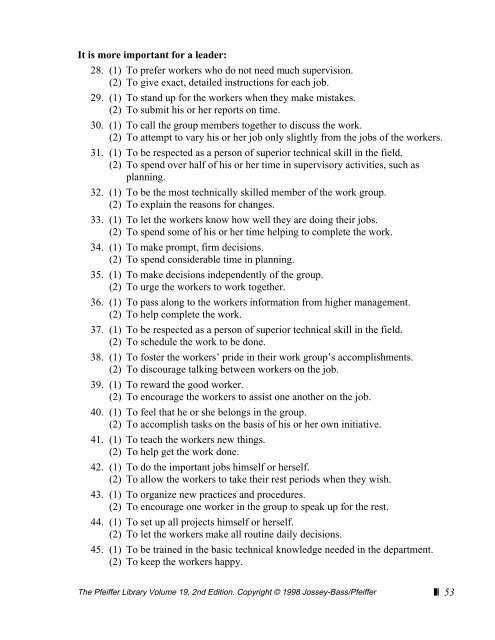motivational analysis of organizations
motivational analysis of organizations
motivational analysis of organizations
You also want an ePaper? Increase the reach of your titles
YUMPU automatically turns print PDFs into web optimized ePapers that Google loves.
It is more important for a leader:<br />
28. (1) To prefer workers who do not need much supervision.<br />
(2) To give exact, detailed instructions for each job.<br />
29. (1) To stand up for the workers when they make mistakes.<br />
(2) To submit his or her reports on time.<br />
30. (1) To call the group members together to discuss the work.<br />
(2) To attempt to vary his or her job only slightly from the jobs <strong>of</strong> the workers.<br />
31. (1) To be respected as a person <strong>of</strong> superior technical skill in the field.<br />
(2) To spend over half <strong>of</strong> his or her time in supervisory activities, such as<br />
planning.<br />
32. (1) To be the most technically skilled member <strong>of</strong> the work group.<br />
(2) To explain the reasons for changes.<br />
33. (1) To let the workers know how well they are doing their jobs.<br />
(2) To spend some <strong>of</strong> his or her time helping to complete the work.<br />
34. (1) To make prompt, firm decisions.<br />
(2) To spend considerable time in planning.<br />
35. (1) To make decisions independently <strong>of</strong> the group.<br />
(2) To urge the workers to work together.<br />
36. (1) To pass along to the workers information from higher management.<br />
(2) To help complete the work.<br />
37. (1) To be respected as a person <strong>of</strong> superior technical skill in the field.<br />
(2) To schedule the work to be done.<br />
38. (1) To foster the workers’ pride in their work group’s accomplishments.<br />
(2) To discourage talking between workers on the job.<br />
39. (1) To reward the good worker.<br />
(2) To encourage the workers to assist one another on the job.<br />
40. (1) To feel that he or she belongs in the group.<br />
(2) To accomplish tasks on the basis <strong>of</strong> his or her own initiative.<br />
41. (1) To teach the workers new things.<br />
(2) To help get the work done.<br />
42. (1) To do the important jobs himself or herself.<br />
(2) To allow the workers to take their rest periods when they wish.<br />
43. (1) To organize new practices and procedures.<br />
(2) To encourage one worker in the group to speak up for the rest.<br />
44. (1) To set up all projects himself or herself.<br />
(2) To let the workers make all routine daily decisions.<br />
45. (1) To be trained in the basic technical knowledge needed in the department.<br />
(2) To keep the workers happy.<br />
The Pfeiffer Library Volume 19, 2nd Edition. Copyright © 1998 Jossey-Bass/Pfeiffer ❚❘ 53

















